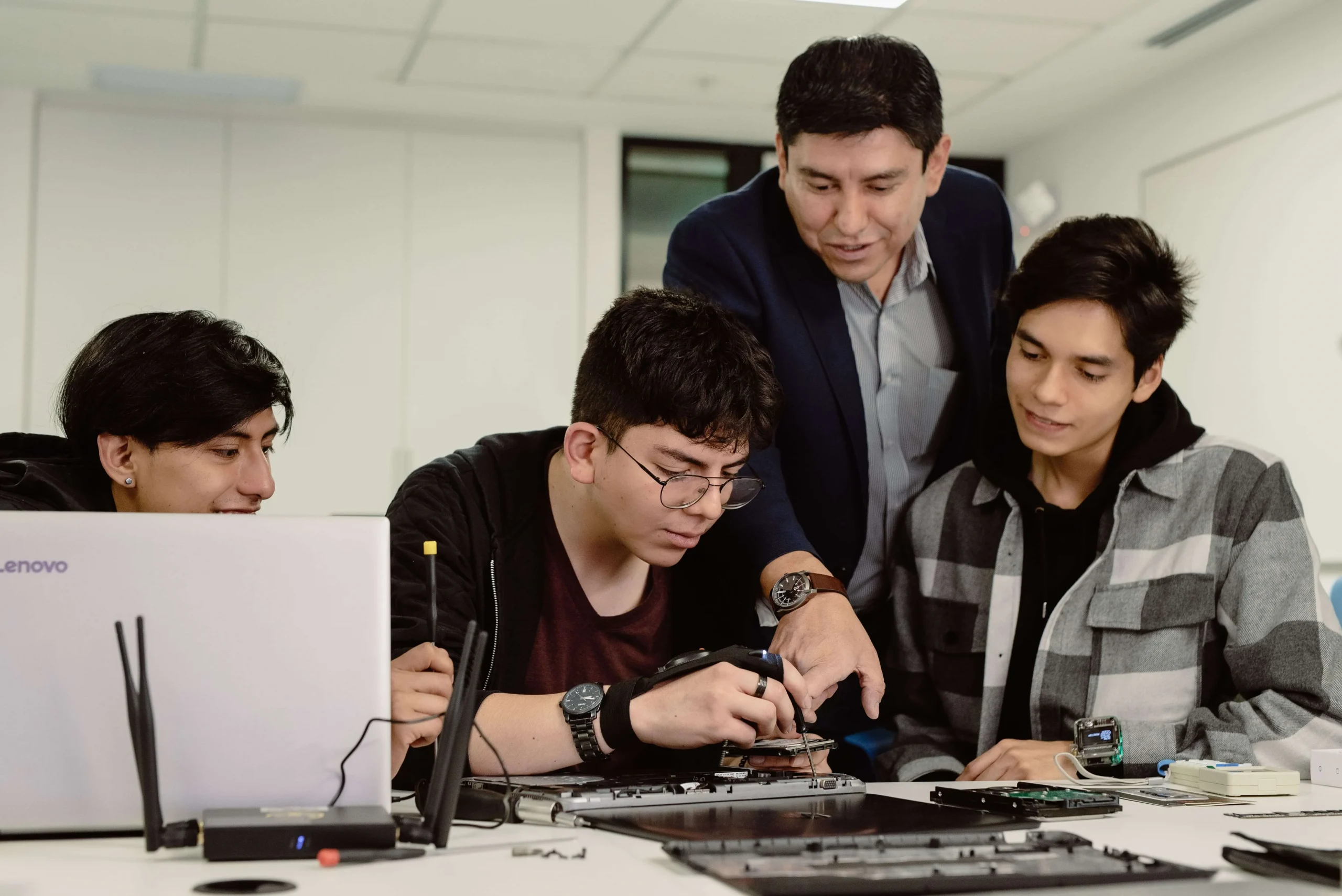Title: Bachelor in Cybersecurity Engineering.
Duration: 9 semesters
Modality: On site
** The curriculum may be subject to changes.
As a Bachelor in Cybersecurity Engineering, you will be at the forefront of the field, capable of applying your technical and business skills to effectively participate in problem-solving, analysis, and project management activities necessary for implementing cybersecurity solutions that protect an organization's information assets.
- Through our academies and educational alliances: CISCO Networking Academy, EC-Council Academy, Red Hat Academy, VMWare Academy, Fortinet Academy, Microsoft Academy, and Oracle Academy, students will receive professional certification courses as part of our plan of study.
- Students will visit the facilities and technological infrastructure of several companies in the country. In addition, they will be part of community outreach projects where they will support the improvement of society's cybersecurity awareness by putting their knowledge into practice.
- Students will have at hand certification laboratories with cutting-edge technology where they can practice at all program levels. They will have access to an Experimental Data Center for specialized hands-on workshops, a Cybersecurity Lab where they will learn attack, defense, and cybernetic monitoring techniques, and a Technological Innovation Unit (UITEC, for its initials in Spanish) where they will develop innovative projects with complete creative freedom.
- Our faculty members are experienced and certified in different areas of cybersecurity and data intelligence, with extensive professional experience in renowned companies in the country.
- Thanks to the university's agreements, students will have access to pre-professional internships in leading companies and institutions related to the field of cybersecurity and data intelligence.
- Students will be part of mirror classes where they will share experiences with academic peers from universities in other countries. They can also participate in exchange programs at international institutions of higher learning.
- Students will have chosen a fast-paced program with a great global projection that responds to new technological trends. The professional and academic training offered will open doors to postgraduate programs of different sorts, both nationally and internationally.
- Learn about the elements of data networks and the norms and standards that govern them.
- Acquire knowledge about databases, their management, and how they support decision-making processes in companies.
- Understand the different types of threats and attacks faced by technological infrastructures to respond promptly with protection measures at an individual, organizational, or industrial level.
- Apply regulations, standards, and best practices related to cybersecurity, technology management, and data intelligence.
- Design and manage cybersecurity projects that protect the information assets and technological infrastructure of organizations.
- Implement techniques of forensic analysis, cryptography, reverse engineering, ethical hacking, and computer auditing.
- Have an educational model based on practice, which allows students to shine in the professional world.
- Develop skills to think critically, innovatively, and creatively while having a global vision.
The employability for a cybersecurity engineer is currently very high and is expected to continue to grow in the future. With the constant increase in cyber threats and the importance of protecting information systems, cybersecurity skills are in high demand across a wide range of industries. Cybersecurity engineers are professionals specialized in protecting information and systems against cyberattacks, as well as developing strategies and policies to prevent and mitigate risks. His knowledge spans areas such as risk analysis, network security, application security, and regulatory compliance. In addition, every organization requires professionals in this field.
A cybersecurity professional can hold many positions depending on their experience, skills, and level of responsibility. Some of the common positions in the field of cybersecurity are:
- Security analist
- Network security engineer
- Application security engineer
- Security architect
- Information security manager
- Cybersecurity consultant
- Pentester
- Digital Forensic Investigator
These are just some of the common positions in the field of cybersecurity, but the field is vast and constantly evolving. Also, as experience is gained and additional certifications are obtained, it is possible to access positions of greater responsibility and leadership in the field of cybersecurity.
The Cybersecurity Engineer from Universidad de las Americas is a competent professional with an entrepreneurial spirit and multidisciplinary vision that will render him capable of both applying technical and business skills to become a trusted advisor to upper management, anticipating cybersecurity challenges, and developing future-focused solutions aligned with business goals.
Graduates will analyze, design, implement best managerial practices, and evaluate solutions to protect the confidentiality, availability, and integrity of information and the security of information systems that support modern organizations. They will be able to effectively communicate proposals that assess risks and defend against several modern-day threats by designing cybersecurity controls to protect information assets in companies using best practices, methodologies, and standards of cybersecurity and computer science. They will also be able to investigate data breaches, and cyber-attacks and build robust cybersecurity systems and long-term strategies to meet organizational objectives and generate value through good management and governance practices in the adoption of new technological trends. Likewise, they will apply the acquired knowledge and different strategies to self-regulate their learning.
The Cybersecurity Engineer from UDLA is expected to lead diverse multidisciplinary work teams in national and international contexts and to conduct themselves in an ethical, creative, proactive, and responsible manner, always respecting all legal frameworks while being committed to the country’s cybersecurity development process for the benefit of society.
- Manage cybersecurity initiatives that identify, prevent, and treat cyberattacks to support the organization’s line of business continuity and preservation.
- Work collaboratively and across disciplines to protect organizations’ vital technological infrastructures and manage cyber risk.
- Strengthen integral skills and lifelong technological adaptability through ongoing training and updating.
- Add value to organizations by exercising the profession with values and ethical principles.
A graduate of the Cybersecurity Engineering program will be able to:
- Identify, formulate, and solve complex engineering problems by applying principles of engineering, science, and mathematics.
- Apply engineering design to produce solutions that meet specific needs with consideration of public health, safety, and welfare, as well as global, cultural, social, environmental, and economic factors.
- Communicate effectively with a range of audiences within the field.
- Recognize ethical and professional responsibilities in engineering situations and make informed judgments, which must consider the impact of engineering solutions in global, economic, environmental, and societal contexts.
- Work effectively in a team whose members, together, exercise leadership, create a collaborative and inclusive environment, set goals, plan tasks, and accomplish objectives.
- Develop and conduct appropriate experimentation, analyze, and interpret data, and use engineering judgment to draw conclusions.
- Acquire and apply new knowledge as needed, using appropriate learning strategies.
This committee addresses issues related to the fulfillment of educational objectives, degree profile, and other academic aspects linked to the program’s development.
Responsibilities
- Review the program’s educational objectives, degree profile, student learning outcomes, and plan of study.
- Propose changes or recommendations to the program’s educational objectives, degree profile, student learning outcomes, and plan of study.
Participants
Title | Name |
Dean of the College of Engineering and Applied Sciences | Diego Buenaño |
Program director | Ángel Jaramillo |
Professor responsible for monitoring alumni | Iván Ortiz |
Curriculum Professor | Ana María Pazmiño |
Employers’ representatives and/or representatives of professional associations or guilds Alumni | Christian Espinosa (President) |
Jorge Guerrón | |
Gerardo Trujillo | |
Diego Balseca | |
Alumni | Joselin García |
Nicholas Gillespie | |
Jhosue Villamil |
Bachelor
| Academic Year | 2018 | 2019 | 2020 | 2021 | 2022 |
| Number of Students | 15 | 27 | 43 | 51 | 88 |
Bachelor Degrees Awarded
| Academic Year | 2018 | 2019 | 2020 | 2021 | 2022 |
| Number of Students | 0 | 0 | 0 | 0 | 8 |
If you are enrolled in another university, you can have your courses recognized through our simulator and study at UDLA.
Apply here





